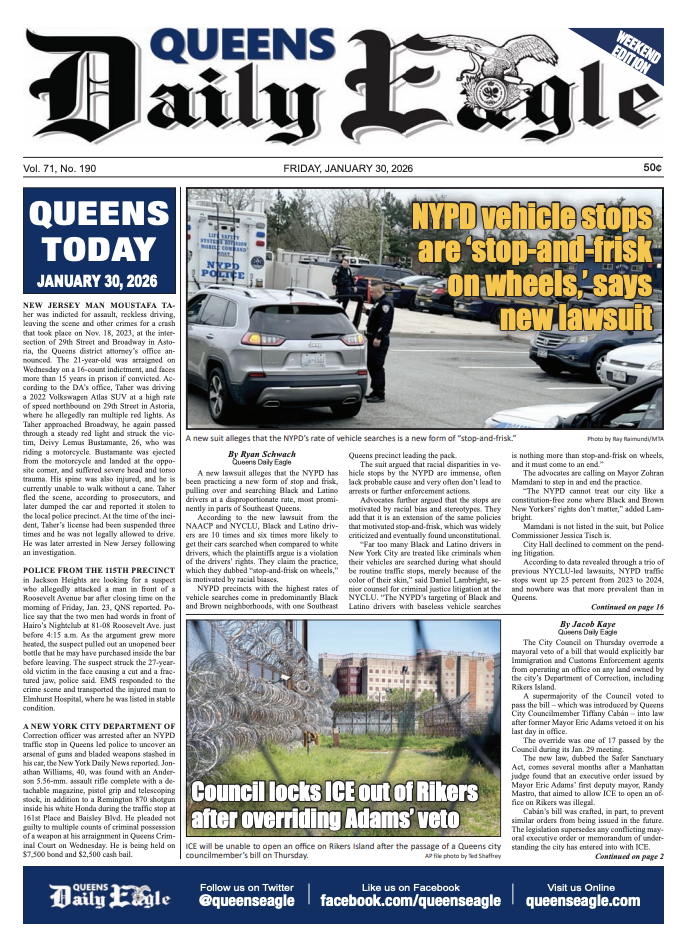Journalist's court challenge would reveal uncounted Queens DA primary ballots
/MELINDA KATZ (LEFT) AND TIFFANY CABÁN (RIGHT) AT A JUNE FORUM HOSTED BY THE EAGLE AND NAACP AT ST. JOHN’S UNIVERSITY. Katz defeated Caban by 55 votes in the Democratic primary for Queens DA. AP PHOTO/MARY ALTAFFER, FILE
By David Brand
In the extremely close Democratic primary for Queens District Attorney, hundreds of affidavit ballots rejected by the Board of Elections could have been a game-changer. Or they could have reinforced the final outcome.
Either way, one journalist wants to find out.
Ted Hamm, chair of the Journalism and New Media Studies Program at St. Joseph’s College, filed a request Monday in Queens Supreme Court to obtain a court order that would unlock 353 affidavit ballots, with voter information redacted, that the BOE never counted. Affidavit ballots are completed by voters whose names do not appear on voter rolls at their polling site.
Hamm acknowledged that the legal challenge would not change the outcome of the election — Borough President Melinda Katz defeated public defender Tiffany Cabán by 55 votes after a full manual recount and lengthy court battle — but he said the ballot information is important for transparency and preparing for future elections.
“We need to see the ballots rejected on technical grounds in order to determine the extent to which the BOE's decisions affected the outcome of the primary,” Hamm told the Eagle. “There are dozens of insurgents challenging machine-backed incumbents in 2020 New York state elections in Queens and elsewhere across the city, so we need to make sure every legitimate vote gets counted.”
Neither Cabán nor Katz are parties in the court challenge. Nor are any other Queens DA candidates or elected officials.
Hamm’s motion specifically requests 230 affidavit ballots rejected by the BOE because they were cast at the wrong polling site and 123 affidavit ballots that the BOE rejected after determining that they were “incomplete.”
The issue of incomplete affidavit ballots prompted Cabán’s campaign to challenge the BOE in court and inspired a statewide debate over New York election law and voting rights.
Affidavit voters place their ballots inside an envelope with identifying information written on the outside, but mistakes on the envelope can invalidate the ballot. The BOE tossed several affidavit ballots in the Democratic primary for Queens DA because registered Democrats did not fill in their party enrollment.
“As a journalist and professor of journalism, and the Petitioner in this matter, it is my view that the uncounted affidavit ballots maintain a significant newsworthy value,” Hamm wrote in court documents. “More than 350 registered voters in Queens were not allowed to have their votes counted.”
Initial results from the June 25 election had Cabán leading Katz by 1,090 votes, but Katz overcame that deficit when the BOE counted absentee and affidavit ballots a few days later. The historically close margin triggered a full manual recount, which Katz held on to win. Katz faces Republican nominee Joe Murray in the Nov. 5 general election.
The city Law Department, which is representing the BOE, declined to comment on pending litigation.
A February state Court of Appeals decision, Kosmider v. Whitney, held that state election law prohibits the release of ballots in response to Freedom of Information Law requests until two years after an election.
Only a court order or legislative action would prompt the release and examination of ballots within the two-year window, the Court of Appeals ruled. Hamm said the Kosmider decision establishes the foundation of his court challenge.
“As outlined in Kosmider a FOIL request will no longer suffice to obtain access to the requested material,” Hamm wrote in court documents.
Hamm told the Eagle there is precedent for his request for a court order and cited several studies conducted of ballots cast in Florida during the 2000 Presidential Election.
“They counted the votes in Florida after Bush v. Gore — and they should do it in Queens,” he said.




